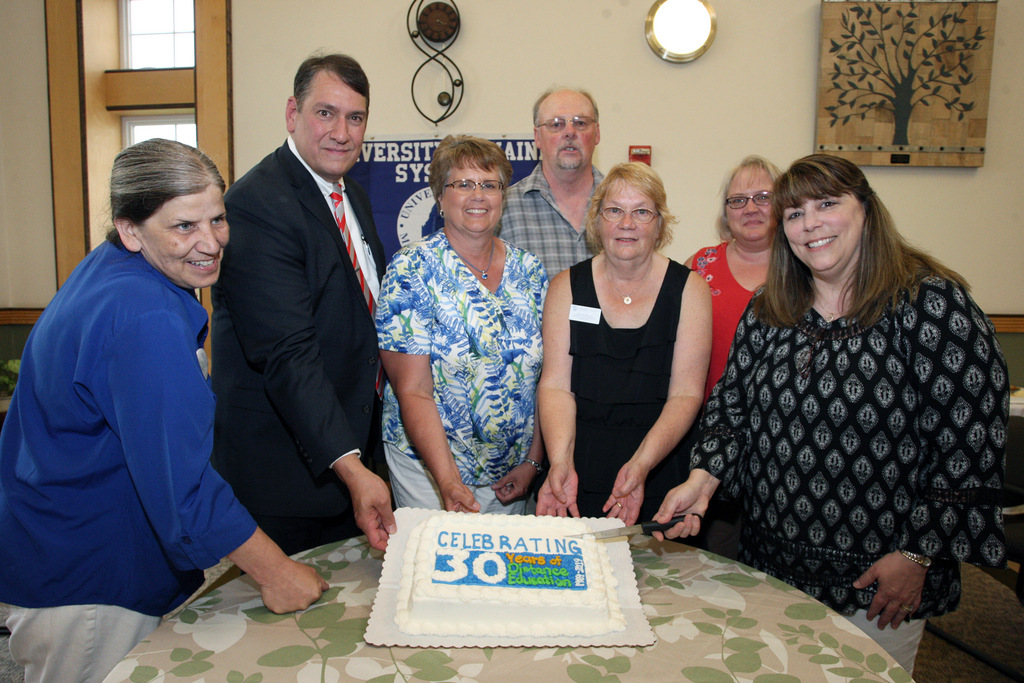
HOULTON, Maine — For 30 years, residents in rural Maine have been able to take courses otherwise not available to them thanks to the distance learning program offered through the University of Maine at Augusta.
On Wednesday evening, the Houlton Higher Education Center joined with centers from Bangor, Brunswick, East Millinocket, Ellsworth, Lewiston, Rockland, Rumford, South Paris and Saco in celebrating the University of Maine at Augusta’s 30th anniversary of this remote learning.
“Thirty years ago, the education network was unveiled,” said UMA President Rebecca Wyke via a teleconference. “UMA, with the support of the University of Maine system, was on the cusp of the technological movement with a goal of reshaping access to higher education.”
In September 1989, the Interactive Television System — more commonly known as ITV — was launched with 40 courses originating from six University campuses. Those courses were transmitted through UMA and available to nine outreach centers across the state.
“Today we celebrate that achievement and all that has been accomplished in the past 30 years,” Wyke said. “One thing that hasn’t changed is our mission to provide Maine people with the highest quality distance education and access to a college degree.”
Barbara Blackstone, University of Maine at Presque Isle dean of students, said without the ability to offer online courses to local residents, many would not be able to pursue a higher education.
“The Houlton Higher Education Center brings a wide variety of educational programs under one roof and has been providing educational opportunities in the region since the early 1990s,” Blackstone said. “Classes continued to be delivered through various modalities including live onsite instructions, video conferencing, interactive television and online courses.”

Carolyn Dorsey, associate professor of business management at the University of Maine at Presque Isle, speaks to the audience Wednesday evening at the Houlton Higher Education Center as part of the 30th anniversary celebration for distance learning. (Joseph Cyr)
Carolyn Dorsey, associate professor of business management at the University of Maine at Presque Isle, was one of the guest speakers at the Houlton Higher Education Center and touched on the future of distance learning.
“What will the next 30 years of distance education hold?” she pondered. “As the landscape continues to change, so does the University of Maine system.”
Dorsey said postsecondary enrollment is dropping every year nationwide and Maine is no exception.
“Maine, like many states, is made up of older residents with fewer high school graduates,” she said. “As the student demographic changes, so too does their needs. More and more learners need to be able to access their education remotely through some form of technology on their own unique schedule.”
Dorsey added that while enrollment in traditional colleges and universities may be declining, distance education enrollments have increased for the 14th straight year. Last year, six million students were enrolled in distance education courses nationally.
“What used to feel like the minority is now the growth leader,” she said.
Joseph Szakas, provost for the University of Maine at Augusta, added that distance learning was a valuable tool for many people who otherwise may not have been able to take postsecondary courses.

University of Maine at Augusta Provost Joseph Szakas addresses a group of about 35 individuals Wednesday evening at the Houlton Higher Education Center as part of the University of Maine’s 30th anniversary celebration for distance learning. (Joseph Cyr)
“Technology continues to change and will adapt,” he said. “Technology achieves our goal of providing successful and quality education for our students regardless of location.”







